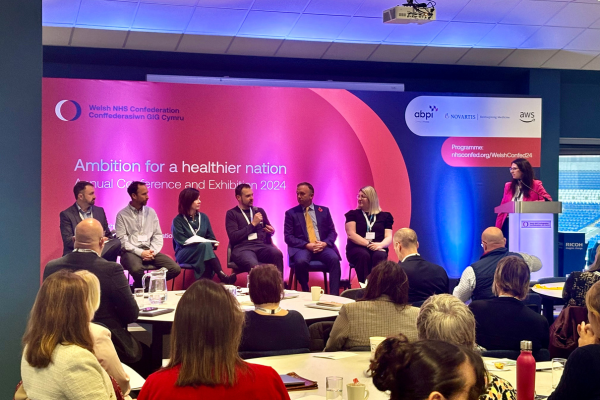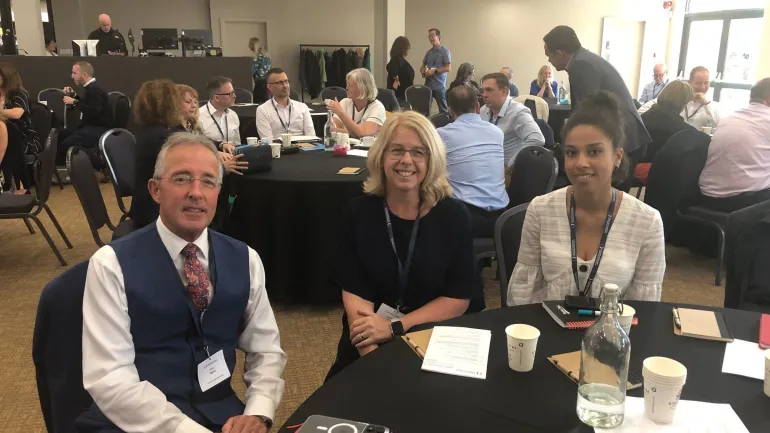The recent Welsh NHS Confederation took place at Cardiff City stadium gathering healthcare leaders, policymakers, and industry partners to share and address some of the most pressing challenges facing the Welsh healthcare system today.

With the theme of building a healthier, more sustainable nation, the conference highlighted an ambitious vision for the future of healthcare in Wales.
Healthcare system challenges and ambition for innovation
The day began with Jeremy Miles, Cabinet Secretary for Health and Social Care, who shared his reflections on the state of the healthcare system. He addressed concerns around waiting times, long waits for routine treatments, and difficulties accessing care. While acknowledging the significant efforts made to address these issues, he emphasised that waiting times for planned care are still not where they should be.
A widespread call emerged for systemic transformation to better meet the evolving demands of modern healthcare. Jeremy Miles and Darren Hughes, Director of the Welsh NHS Confederation, spoke about shifting to a proactive, preventative model of care to manage future demands. Many speakers, including those on the technology and data panel, discussed how digital transformation, cloud computing, and innovations like AI and genomics can drive efficiency and improve patient outcomes. However, there was also recognition of "pilot fatigue" in Wales, with leaders calling for the sustainable scaling of successful pilot programs to maximize impact across the nation.
Jeremy Miles also highlighted the positive progress being made across the health and care system, stressing that each health board and organisation has something valuable to share and inspire other parts of the health service. A recurring theme throughout the day was the importance of learning from one another and embedding a culture of continuous innovation and collaboration to create a healthcare system that is both sustainable and fit for modern demands.
Leadership and workforce support
At the core of discussions was the emphasis on leadership highlighted by Jonathan Morgan, Chair, Welsh NHS Confederation, and other key speakers. They discussed the vital role of strong, compassionate leaders in navigating the NHS through difficult times, especially as the service faces winter pressures and continued recovery from the pandemic.
Jeremy Miles acknowledged the incredible dedication of NHS staff and leaders who deliver services while planning for the future, whilst also highlighting that the NHS in Wales must continue to adapt to both immediate and long-term challenges, with effective leadership as the driver of this transformation.
One standout talk on leadership and workforce support came from Dr. Sabrina Cohen-Hatton, a motivational speaker who shared her powerful personal story. From homelessness to becoming a firefighter, Sabrina highlighted the transformative power of resilience and the unique strengths that come from diverse backgrounds. Her story resonated deeply with healthcare leaders, reminding them that the challenges we face can often become the foundation for our greatest opportunities.
Sabrina’s story reminds leaders that the diverse backgrounds and perspectives of each team member strengthen organisations, highlighting the value of taking risks; and when leaders model thoughtful risk-taking, they create a space where employees feel free to innovate and grow.
A central message that Sabrina stressed was the importance of psychological safety, noting that workplaces thrive when people feel safe to feel vulnerable, admit mistakes, and share ideas without fear of judgement. Sabrina closed by highlighting the power of daily interactions in shaping workplace culture, and that inclusive, psychologically safe environments aren’t created overnight; they’re built through consistent, open, and empathetic communication. Sabrina’s message was clear: by fostering an environment where everyone feels valued, leaders lay the foundation for cohesive, innovative, and empowered teams.
Data and transparency
A significant focus of the conference was on the effective use of data, particularly in increasing transparency and leveraging data for decision-making and patient care improvements. Jeremy Miles highlighted the importance of regularly publishing NHS performance data to drive accountability and learning. Additionally, Digital Health and Care Wales’ ‘lifelong health record’ initiative to unify patient data, enhancing integration across health boards. This data-driven approach, as seen in projects like palliative care dashboards, allows for better resource management and informs adjustments to patient care pathways.
Innovation was consistently recognised as a vital pathway to sustainable healthcare, particularly in the context of technological advancement and digital solutions. Embracing AI and digital applications is seen as essential to meeting evolving demands, with a strong emphasis on cloud-based data solutions. In the AWS breakout session, the discussion highlighted the ambition to harness data for better outcomes and more efficient processes. A central focus remained on enhancing the patient experience, allowing greater engagement with healthcare through technological developments.
Collaborative partnerships and patient-centric care
Patient-centred care was discussed throughout many talks, particularly through greater data transparency and the sharing of best practices across health boards. The implementation of projects like QuicDNA, which accelerated the diagnostic pathway for lung cancer patients, highlighted how a transparent, data-driven approach can directly benefit patients by reducing waiting times and personalising care.
Prevention emerged as a prominent discussion, with speakers including Matthew Taylor, CEO, NHS Confederation underscoring the need for a shift toward preventive and community-centred care. Addressing long-term public health challenges requires prioritising early intervention and integrating health and social care services. By driving preventive strategies and embedding them within community services, the NHS can ease some of the pressure on hospitals, creating a more resilient health system.
In conclusion, the Welsh NHS Confederation conference reinforced the importance of bold leadership, collaboration, and innovation in building a resilient healthcare system. While challenges remain, the day's discussions emphasised that a proactive, patient-centred approach rooted in shared learning and collaborative action is key to creating a healthier, more adaptable Wales.
If you didn’t catch us at the conference but would like to learn how we can help you play a vital role in this by driving your innovation to the frontline of health and social care, then get in touch.



